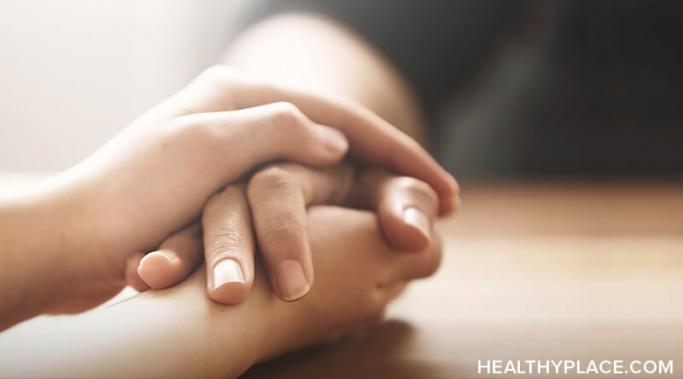Other than a trip to the hospital, my Thanksgiving was great. I became ill almost immediately after the dinner and assumed I had indigestion. On the following Sunday, I called my doctor after Googling "indigestion lasting three days." The nurse sent me to the emergency room (ER), where I was admitted with a diagnosis of acute pancreatitis. That may not sound like the most educational of experiences, but I've learned three things about mental illness and how it is affected by physical health.
Stigma - Recovering from Mental Illness
It's difficult for some loved ones to give us validation for our mental illness because they don't want to believe we're in so much pain that they cannot heal. Mental illnesses and the symptoms they cause can sometimes put us in a great deal of pain. We have a need to share our pain with others. There’s just a desire in us for people we care about to know that we’re hurting. We want them to know so they can comfort us, reassure us, and take care of us. Mental illness validation from our loved ones and doctors helps us to recover.
Sometimes I feel strange and different from healthy people. Perhaps we internalize stigma because we feel a deep sense of shame. We’re offbeat, eccentric, weird and ashamed.
Shame makes me want to hide the real me. I don’t want others to see the real me, the one who is embarrassed to be thought of as mentally ill. I don’t want HealthyPlace readers to know it either because I’m afraid they might stigmatize me the other way, perhaps get angry with me because I still sometimes succumb to the disconcerting voice of stigma.
One of the worst things about having a mental disorder is the symptoms the mental disorder causes. These symptoms are the cause of much suffering for those of us who have received a mental health diagnosis. We face our symptoms every day, sometimes every minute of the day. They can cause us to see the world and the circumstances of life very differently than people who aren’t mentally ill.
Because we sometimes perceive things this way, we occasionally come into conflict with people. It’s often family who don’t comprehend our behavior, especially since they see us at our worst. Misconceptions can, and do, happen, frequently, on both sides. Of course, it’s not only we who misperceive. Misperceptions can lead to stereotyping, part of mental health stigma. Let’s look at some examples of these stereotypes.
I have heard a phrase repeated by some in the mental health community. “We just want to be treated like everyone else.” Really? I don’t. Why? Because I certainly am not like everyone else and if you apply their standards to me I lose.
Another thing I’ve heard. People with mental illness should be held accountable for their actions just like everyone else—there it is again, “just like everyone else.” I understand the sentiment. It may be what they’re saying is “we don’t want to be discriminated against. Treat us like everyone else.”
I want to tell you about my neighbors. That is, I would tell you about my neighbors if I knew any of them. Now partly, it's a societal change. Many people just aren't neighbors anymore in the classic sense of the word. Oh sure, we'll wave across the fence, but that's pretty much it. I've lived in the same house for 14 years now.
The reason I don't do the neighbor thing is because I don't want them to know me.
It happened again the other night. A person that I largely respect asked me about my Mental Health Awareness ribbon. Happy to have an opportunity to discuss mental health, I explained that the lime green ribbon represents bringing mental health into the limelight. This person retorted:
"There are so many crazies."
"Why talk about it? Lock them up and end the threat to society."
Halloween and Dia De Muertos (The Day of the Dead) can be child's play. Ghosts, goblins, superheroes, Disney princesses and more bring both smiles and horror. For those with a mental illness, PTSD or panic, Halloween can conjure up very intense negative responses.
Sometimes horror flickers on the TV screen or in the movie theater, sometimes horror is found behind a mask, sometimes it comes to visit wrapped in "Trick or Treat!" Potential triggers lurk everywhere: black cats, oversized spiders, masks, horror movies and even costumes that perpetuate mental health stigma, domestic violence and much more. Ahhh, the midnight hour.
Stigma: a fallacy based on preconceived notions. I am going to go out on a limb here: Everyone at some point in his or her life has experienced stigma. Maybe because we have a lisp, a limp, maybe due to a physical impairment or maybe due to socioeconomic status. Stigma is nearly always directed at something we are unable to fully control.
In this age of awareness and enlightenment, mental health awareness still generates a great deal of ignorance. Sometimes, even well-meaning statements perpetuate stigma, even on sites that seek to eradicate said stigma. Recently, the poster below came across my news feed from several mental health and depression pages. The depression quote is attributed to Mark Epstein, an American psychologist. While Mr. Epstein's credentials seemingly qualify him to speak knowledgeably on the subject, I do strenuously disagree with this quote's assertion.








